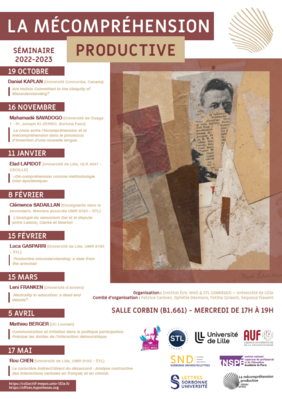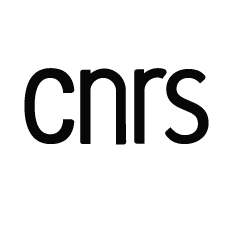Séminaire MEPRO
SéminaireLa mécompréhension ne se réduit pas à l’incompréhension. Elle ne tient pas seulement à l’absence de sens : lorsqu’on comprend mal, on comprend quand même quelque chose. Pour cette raison, ce qu’on comprend quand on comprend mal ne peut être saisi sous le même régime que la compréhension « simple » du sens visé. En outre, l’expérience nous montre que, même dans ces cas « simples », notre saisie s’avère souvent partielle. La mécompréhension semble dès lors jouer un rôle constitutif de tout sens. Ne faudrait-il pas, par conséquent, dépasser le caractère négatif de la mécompréhension, comprise comme un défaut de compréhension, et la regarder autrement, c’est-à-dire comme une étape essentielle à toute saisie d’un sens ? Dans cette perspective, le séminaire de La mécompréhension productive propose de s’intéresser à la manière dont la mécompréhension produit du sens, en adoptant des approches disciplinaires variées : herméneutique, logique, sciences politiques, littérature, science du langage, psychologie sociale, anthropologie, etc.
Comité d'organisation : Patrice Canivez, Ophélie Desmons, Fatiha Iznasni, Sequoya Yiaueki
stl.univ-lille.fr/recherche/seminaires/seminaire-mepro
Daniel KAPLAN (Université Concordia, Canada)
Titre : The Ubiquity of Misunderstanding under Holistic Theories of Meaning
Abstract : According to a widespread view of communication, speaker and hearer must converge on all relevant aspects of the sentence meaning in order for the hearer to be said to understand what the speaker said. Call a theory of meaning "atomistic" if the relevant aspects of sentence meaning require no reference to features external to the sentence. Call a theory holistic (= non-atomistic) if relevant aspects of sentence meaning make essential reference to features external to the sentence. According to a well-known objection, holistic theories of meaning require convergence on so many aspects of a sentence's meaning that it is a miracle that communication occurs at all. That is: misunderstanding is ubiquitous. In this talk I explore the relationship between meaning, understanding, and holism/atomism by looking closely at the radical contextualism debate in the philosophy of language. I argue that the sort of misunderstanding worried about is not ubiquitous, though (unlike the widespread view above) there is still room for a more interesting kind of misunderstanding to persist. I close the talk by considering the different kinds of misunderstanding that are made possible by holistic theories of meaning.
zoom : https://univ-lille-fr.zoom.us/j/91434696114?pwd=WVZJSzRJUzNEVitYUmpzK2FrUm11dz09

